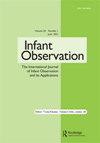Editorial: RIOB-21-3
Q4 Psychology
引用次数: 0
Abstract
We made an editorial decision earlier in the year that we would include two symposia of papers about work discussion which were given at the first International Work Discussion Conference in Vienna in 2016 and that these would form the bulk of two issues of Volume 21 leaving us with a relatively modestly sized third issue for the year. The papers which we have included in Volume 21-3 represent different aspects of the heritage of Esther Bick as it has spread to many parts of the world as well as within the UK. A paper entitled ‘Baby’s wellbeing, baby’s discomfort; what about the observer?’ is written by a group of authors from Nantes in western France. The paper looks at some lovely, detailed observation of two babies focusing on one occasion when the babies were clearly feeling at ease and on another where each baby was ‘in discomfort’. The authors look again at observation sequences and consider the baby’s feelings and those of the mother and of the observer. The discussion considers that what is observed and understood about the states of mind of mother and baby evolves through observation, then the process of writing notes, in which the observer is putting events and feelings into words, followed by developments when the material is presented and discussed with the seminar leader and other observers in the group. The authors suggest that wellbeing or discomfort refers to a process at work in both the mother and child relationship and in what the observer experiences, while observing, then writing notes and, finally in presenting the written record for discussion. In a paper for this journal published some years ago (Caron, Sobreira Lopes, Steibel, & Schneider Donelli, 2012) Nara Caron and Rita Sobreira Lopes consider the stages of ‘processing’ any observation in a similar way adding a fourth stage, that of writing and publishing. They consider that observation itself is first experienced in a predominantly sensory and solitary way in which the observer is exposed to a series of feelings which emerge again in the written report and then again in sharing the report with the group. The fourth, optional stage, is the publication of the material for dissemination and discussion to a much wider group and to contribute to research. Observing babies often puts the observer in touch with non-verbal, ‘primitive’ very unsettling feelings, which take time to describe in words and then to metabolise, using one’s own thinking self, and almost always with the support of others. It is accepted in the world of infant observation that observers need support, just as new parents do in order not to feel isolated and overwhelmed. The new observer, in parallel with the new parent, is in an unfamiliar and emotionally charged situation, responsible for the helpless baby, and, in turn, often feeling vulnerable and in need of care herself. While the observer is only present for an hour a week, this ‘new experience and new concept’ is quite overwhelming to many. Gurleen Matharu and Alejandra Perez have done some research into postgraduate students’ experience of parent–infant observation which is a requirement of two Master’s courses in Developmental Psychology, the MSc in Psychoanalytic Developmental Psychology and the MSc in Developmental Psychology and Clinical Practice (taught at the Anna Freud Centre and accredited by University College, London). They note that in many institutions, infant observation is the first part of clinical training in psychoanalytic编辑:RIOB-21-3
我们在今年早些时候做出了一个编辑决定,我们将包括2016年在维也纳举行的第一届国际工作讨论会议上发表的关于工作讨论的两篇专题论文,这些论文将构成第21卷两期的大部分,从而为我们今年留下相对适度的第三期。我们在第21-3卷中包含的论文代表了埃斯特·比克遗产的不同方面,因为它已经传播到世界许多地方以及在英国境内。一篇题为《婴儿的幸福,婴儿的不适;观察者呢?是一群来自法国西部南特的作家写的。这篇论文对两个婴儿进行了一些可爱的、详细的观察,其中一个是婴儿明显感到自在的情况,另一个是每个婴儿都感到“不舒服”的情况。作者再次观察了观察序列,并考虑了婴儿的感受以及母亲和观察者的感受。讨论认为,通过观察和理解母亲和婴儿的心理状态,然后是写笔记的过程,在这个过程中,观察者将事件和感受用文字表达出来,然后是在材料呈现并与研讨会负责人和小组中的其他观察者讨论时的发展。作者认为,幸福或不适指的是母子关系中的一个过程,以及观察者在观察时的经历,然后写笔记,最后提出书面记录供讨论。在几年前为本杂志发表的一篇论文中(Caron, Sobreira Lopes, Steibel, & Schneider Donelli, 2012), Nara Caron和Rita Sobreira Lopes以类似的方式考虑了“处理”任何观察的阶段,并增加了第四个阶段,即写作和出版。他们认为,观察本身首先是以一种主要的感官和孤独的方式体验的,在这种方式中,观察者暴露在一系列的感受中,这些感受再次出现在书面报告中,然后再次与群体分享报告。第四个可选阶段是出版材料,以便向更广泛的群体传播和讨论,并为研究作出贡献。观察婴儿通常会让观察者接触到非语言的、“原始的”、非常令人不安的感觉,这种感觉需要时间来用语言来描述,然后用自己的思维来代谢,而且几乎总是在别人的支持下。在婴儿观察的世界里,人们普遍认为观察者需要支持,就像新父母为了不感到孤立和不知所措一样。新的观察者,与新的父母一样,处于一个陌生的、充满感情的环境中,要对无助的婴儿负责,反过来,她自己也经常感到脆弱,需要照顾。虽然观察者每周只在场一个小时,但这种“新体验和新概念”对许多人来说是相当压倒性的。Gurleen Matharu和Alejandra Perez对研究生的亲子观察经验进行了一些研究,这是两个发展心理学硕士课程的必修课程,精神分析发展心理学硕士课程和发展心理学与临床实践硕士课程(在安娜弗洛伊德中心教授,由伦敦大学学院认证)。他们指出,在许多机构中,婴儿观察是精神分析临床训练的第一部分
本文章由计算机程序翻译,如有差异,请以英文原文为准。
求助全文
约1分钟内获得全文
求助全文

 求助内容:
求助内容: 应助结果提醒方式:
应助结果提醒方式:


